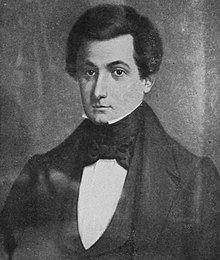Robert Williams (Mississippi politician)
Robert Williams | |
|---|---|
 1917 photo of oil portrait on display in Mississippi Hall of Fame | |
| Governor of the Mississippi Territory | |
| In office 1805–1809 | |
| President | Thomas Jefferson |
| Preceded by | William C. C. Claiborne |
| Succeeded by | David Holmes |
| Member of the U.S. House of Representatives from North Carolina's 3rd district | |
| In office March 4, 1797 – March 3, 1803 | |
| Preceded by | Jesse Franklin |
| Succeeded by | William Kennedy |
| Personal details | |
| Born | ca. 1770 Surry County, North Carolina |
| Died | January 25, 1836 (aged 65–66) Ouachita Parish, Louisiana |
| Resting place | Bon Aire plantation near Monroe, Louisiana |
| Political party | Democratic-Republican |
Robert Williams (ca. 1770 – January 25, 1836) was Governor of the Mississippi Territory from 1805 to 1809.
Biography[]
Robert Williams was born in Surry County, North Carolina. Sources vary on his birth year, with some listing 1768[1] or 1770[2] or 1773.[3] He received a liberal private education, studied law, and became an attorney.[4]
In 1796 Williams was elected as a Democratic-Republican to the United States House of Representatives, and he served three terms, 1797 to 1803.[5]
In 1803 President Thomas Jefferson appointed Williams to the federal commission empowered to determine the legitimacy of land claims in the recently acquired Mississippi Territory.[6] In May 1805 Jefferson appointed him governor, and he served until the end of Jefferson's term in March 1809. During his term as governor, Williams became unpopular as the result of a dispute with territorial secretary Cowles Mead, with each accusing the other of having been sympathetic to Aaron Burr's alleged conspiracy.
After leaving office, Williams lived in Mississippi and North Carolina and operated plantations, also serving during the War of 1812 as adjutant general of the North Carolina militia.
After the 1814 death of his wife in Washington, Mississippi, Williams moved to a plantation near Monroe, Louisiana, which he called Bon Aire. He operated Bon Aire until his death in Ouachita Parish, Louisiana, on January 25, 1836.[7] He was buried at Bon Aire, but the exact location of the grave is not known. It is the present-day site of the Baptist Children's Home and Sellers Baptist Maternity Home in Monroe.[8]
Robert Williams' brother Lewis served as a Congressman from North Carolina, and his brother John served in the United States Senate from Tennessee. His cousin Marmaduke Williams also represented North Carolina in the U.S. House.
References[]
- ^ The Governors of Mississippi
- ^ Dictionary of North Carolina Biography
- ^ Congress BioGuide
- ^ Rowland, Dunbar (1912). The Official and Statistical Register of the State of Mississippi. Nashville, TN: Brandon Printing Company. p. 22.
- ^ Rowland, Dunbar (1907). Mississippi: Comprising Sketches of Towns, Events, Institutions, and Persons, Volume 2. Atlanta, GA: Southern Historical Publishing Company. p. 973.
- ^ Niles, Hezekiah (August 19, 1826). "Members of Congress, Appointed to Office". Niles' Weekly Register. Washington, DC. p. 427.
- ^ Sumners, Cecil (1980). The Governors of Mississippi. Gretna, LA: Pelican Publishing. p. 38. ISBN 9780882892375.
- ^ Sierichs, Bill (March 29, 1983). "Tombstones Shed Light on Past". Monroe-West Monroe News-Star (via Ancestry.com). Monroe, LA.
External links[]
- United States Congress. "Robert Williams (id: W000534)". Biographical Directory of the United States Congress.
- Robert Williams at Find a Grave
- 18th-century births
- 1836 deaths
- People from Surry County, North Carolina
- People from Washington, Mississippi
- People from Ouachita Parish, Louisiana
- North Carolina Democratic-Republicans
- Mississippi Democratic-Republicans
- Members of the United States House of Representatives from North Carolina
- Democratic-Republican Party members of the United States House of Representatives
- Governors of Mississippi Territory
- American militiamen in the War of 1812
- American militia generals
- Burials in Louisiana
